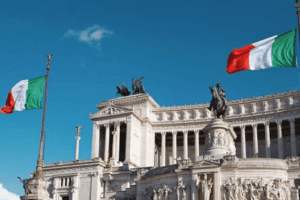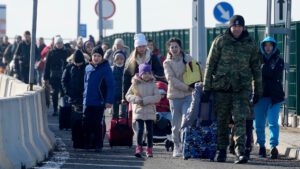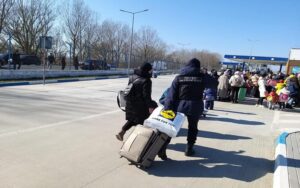
More than 700,000 people have left Ukraine for Germany since the start of Russia’s special military operation at the end of February, European media reported.
According to the newspaper Welt am Sonntag, which refers to the data of the Ministry of Internal Affairs, from February 24 to May 11, 727,205 people were registered in the Central Register of Foreigners of Germany, among which 93% have Ukrainian citizenship. The number of women among refugees reaches about 81%. About 40% of refugees are minors.
The newspaper points out that a significant number of these people could go to other countries of the European Union or return to Ukraine.
According to the International Organization for Migration, about 6 million Ukrainians have left the country since the end of February, going to neighboring countries.

More than 700,000 people have left Ukraine for Germany since the start of Russia’s special military operation at the end of February, European media reported.
According to the newspaper Welt am Sonntag, which refers to the data of the Ministry of Internal Affairs, from February 24 to May 11, a total of 727,205 people were registered in the Central Register of Foreigners of Germany, among which 93% have Ukrainian citizenship. The number of women among refugees reaches about 81%. About 40% of refugees are minors.
The newspaper points out that a significant number of these people could go to other countries of the European Union or return to Ukraine.
According to the International Organization for Migration, about six million Ukrainians have left the country since the end of February, going to neighboring countries.

The European Investment Bank (EIB) is preparing a EUR4 billion financing program that will help EU member states take in Ukrainian refugees fleeing the war, as well as ensure the development of critical social infrastructure.
“The new EIB programme, awaiting Board approval, aims to finance the development of key social infrastructure to provide public services for refugees, in particular housing, schools, hospitals and kindergartens,” the bank said on Saturday.
The EIB has pledged to support communities to receive refugees and provide them with critical social services during the international fundraising event in support of the victims of Russian aggression “Stand up for Ukraine”, taking place in Warsaw on this day and organized by the European Commission, the Government of Canada and Global Citizen.
The financial assistance will be complemented by free advisory support to assist local authorities in EU Member States in rapidly assessing local needs and in planning, prioritizing and preparing appropriate investment projects.
“We are all stunned by the terrible destruction inflicted on Ukraine and its citizens, millions of whom are fleeing the country in search of peace and security. The horror that we are witnessing only strengthens our resolve to act,” Bank President Werner Hoyer was quoted in the release as saying.
Through our initial Solidarity Package with Ukraine and this new 4 billion euro program for EU member states, we will support Ukraine and also help: with housing, schools, hospitals. I am deeply grateful to President Ursula von der Leyen and Prime Minister Justin Trudeau for their leadership and for mobilizing the global community for Ukraine. The world must match the exemplary courage and resilience of Ukrainians, as well as help them and those who support them.”
The bank recalled that from March 8 to March 25 it had already transferred EUR668 million to the government of Ukraine for emergency liquidity support.
In addition, the EIB is working to provide further funding to enable the government of Ukraine to continue to provide critical public services for citizens remaining in Ukraine. According to the agreements between Hoyer and Prime Minister of Ukraine Denys Shmygal, these funds are provided to support transport, energy, urban development and digital projects.
The EIB will continue to explore opportunities to support Ukraine and Ukrainian refugees together with the European Commission, in particular through the Social Investment and Skills Window component of the recently launched InvestEU programme, the report also says.
According to the UN, Russian aggression against Ukraine has resulted in 7.1 million internally displaced persons and 3.8 million refugees.
The EIB is the long-term lending institution of the European Union. Its owners are the member states of the European Union. The Bank provides access to long-term financing for prudent investment in order to implement European Union policies.

The Italian government has introduced for refugees from Ukraine a period of one-year year assistance program, according to the Daily News.
The corresponding decree was signed by Italian Prime Minister Mario Draghi on March 30.
“A mechanism for temporary assistance to refugees arriving from Ukraine is being established,” the document says.
Ukrainians will have access to the healthcare system, labor market and social benefits.
Italian visas are issued by the police in Italy.
Also, every visitor from Ukraine will be able to receive monthly assistance in the amount of EUR300. Assistance is paid for a maximum of 3 months. The corresponding declaration was signed by the head of Italian civil protection Fabrizio Curcio.

On Friday, March 18, the number of Ukrainian citizens who arrived in Poland exceeded 2 million people, the Polish Border Guard Service reports.
“Today, that is, March 18, by 9:00 am, the number of refugees from Ukraine exceeded 2 million people. Mostly they are women with children,” the Twitter message says.

The number of refugees from Ukraine to Moldova is gradually declining, the head of the Emergency Situations inspectorate of the Interior Ministry of Moldova, Alexander Oprea, said.
“The number of refugees arriving on the territory of Moldova is gradually decreasing. According to the Border police, the flow of refugees to Moldova began to decline from March 8. At the same time, refugees continue to leave Moldova for the EU countries,” he said.
He said that from March 8 to March 13, some 242 bus trips were made and more than 8,000 people were transported to the border with Romania. Over 4,000 people from Ukraine arrived in Romania by train, including a special trip for refugees organized by the Moldavian Railway.
Oprea added that special trips for refugees have been organized in recent days: several trips have been made to Istanbul, Frankfurt am Main, Tel Aviv. The sky over Moldova remains closed, flights are operated only by special order of the State of Emergency Commission.
“If as of March 8, some 128,759 refugees were staying in Moldova, then as of March 14, there were 102,836 people, of whom 48,405 were children. There are 96 authorized accommodation centers in Moldova, two special centers organized by the Ministry of Internal Affairs. More than 4,000 places for accommodation remain available,” Oprea said.
In connection with the situation in Ukraine, the Moldovan parliament declared a state of emergency in the country for a period of 60 days, starting from February 24.